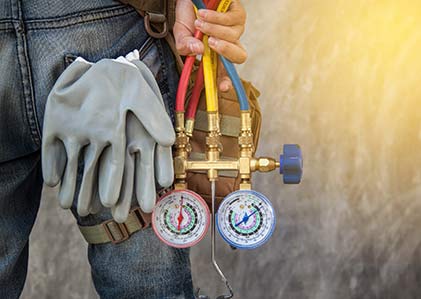Air Filtration and Purification
“With the Covid-19 pandemic on everyone’s mind, air purification is of utmost concern,” says Clint Shurtleff, Heating and Refrigeration Department Manager at New England Institute of Technology (NEIT). “Using a modern duct heating system is the most efficient way to clean and purify the air if properly installed with the ancillary equipment. This type of system can provide a very high level of confidence for the elimination of airborne contaminants within the structure.”
The first line of defense is to replace all low-grade air filters with High-Efficiency Particulate Air (HEPA) filters. HEPA filters are effective for viruses, but may not be 100 percent effective after only one pass through the filter. If the system is set up as a Constant Air Circulation (CAC) system, the filter may operate in the range of 99 percent effectiveness.
Researchers from Tel Aviv University have recently found that Covid-19 particles can be killed with ultraviolet light-emitting diodes (UV-LEDs). In less than 30 seconds, researchers were able to destroy more than 99.9 percent of the coronavirus. Disinfection systems based on these bulbs could be installed in a ventilation system and/or air conditioner, and sterilize the air that passes through them. This could be a breakthrough: the types of bulbs the researchers used are cheaper, safer, and more plentiful than the existing alternatives.
“Along with the HEPA filters, UV lamps installed within the plenum of a warm air system have been shown to reduce infections from viruses,” Shurtleff says. “UV radiation has been utilized to disinfect air, water, and nonporous surfaces and has been shown to destroy the outer protein coating of the SARS virus. It may be effective in destroying the Covid-19 virus in the same manner because both are coronaviruses.”
But there are limitations as to how effective UV radiation may be when inactivating a virus, and UV radiation only works effectively if the virus has direct exposure to the radiation. Furthermore, UV radiation can cause injury to skin and eyes if individuals are exposed to it for any period of time. As a result, UV lamps are commonly installed within the ductwork of an HVAC system.
Some advanced home air purification systems can outperform HEPA filters: particularly, Electronic Air Cleaners (EAC) with pre-filters and electrostatic charging plates. These electronic filters can trap up to 99 percent of contaminants as small as 0.1 microns in size. By comparison, the Covid-19 virus is 0.12 microns. But it’s not a set-and-forget technology: it requires regular maintenance that takes appropriate precautions.
“The pre-filter should be cleaned or changed every six to 12 months to maintain proper operation,” Shurtleff says. “When changing filters it would be wise to assume that there may be some active microbiological material on them. With this in mind, take precautions in handling the filters. Wear a quality mask and gloves, and dispose of them in a plastic bag, and, if renewable, clean them outside in the fresh air. Make sure to dispose of gloves and mask in the plastic bag and sanitize tools and your hands.”



